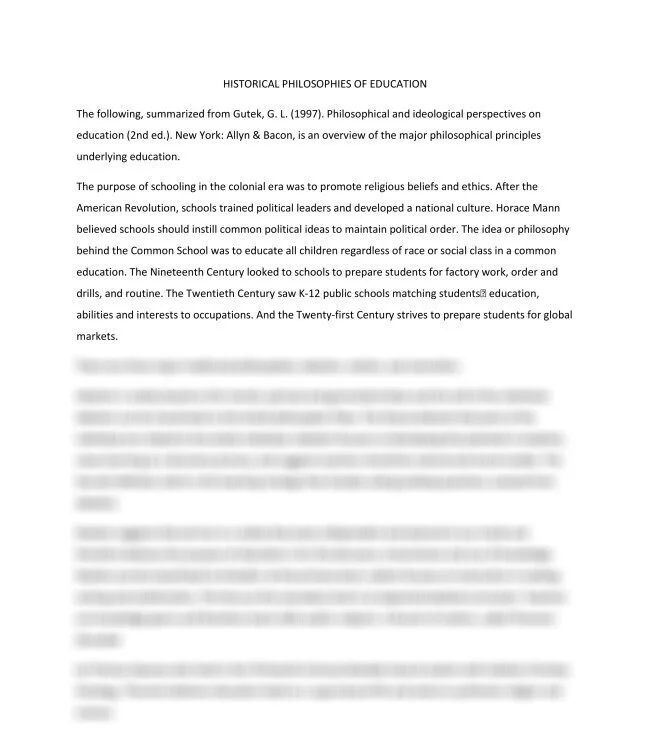HISTORICAL PHILOSOPHIES OF EDUCATION
HISTORICAL PHILOSOPHIES OF EDUCATION
& (1712-1778). (1859-1952). (1997). (2nd (founded (taken A According After Allyn American And Aquinas Aristotle. As At Bacon, Catholic Century Century) Century, Christian Common Dewey EDUCATION G. Greek Gutek, He Horace Idealism In Jean-Jacques John K-12 L. Mann Marxism, Method, Naturalism Nazism, Neo-Marxism, New Nineteenth OF PHILOSOPHIES Philosophical Plato. Pragmatism Problem-solving Progressivism Realism Reconstructionism Reconstructionist Revolution, Rousseau School Schools Socratic Stalinism). Students Teachers The There They Thirteenth Thomas Thomism Twentieth Twenty-first York: a abilities about above according act actively activities activity, agree all already also an analysis, and and/or are arisen as asking aspects at back be began behind beliefs believe believed believes between blended both branch but by called can child child. children class classics. collaboration collaborative colonial combinations common community competition concerned conservatism, contemporary contrast contributor create crisis. cultural culture. curriculum curriculum. departmentalized determined, developed developed: developing development. develops directed discovery discovery, discussions, do draws drills, early ed.). educate education education, education. educational efforts elementary, emphasis encourages environment. era ethics. evolved examine existentialism, exists experience, explore external factory fascism, finding five focus focuses following following, follows for four free from generalized global growth guide guide. have her heritage. high his human idea idealism, idealism. ideas ideological in include includes independent individual individual. individuals indoctrination informal instead instill instruction intelligence intent interact interact. interests interests. is issue-centered issues junior knowledge-givers knowledge. leaders leading leads learning learning. level level, levels liberalism, life limited live lived looked looking main maintain major many markets. matching mathematics. may mental, middle minds models. moral national nationalism, natural naturalism naturalism. nature neo-conservativism, new not not. numerous occupations. of on one or order order. organization: our overview part participation parts permissive perspectives philosopher philosophical philosophies philosophies: philosophy philosophy, planning, political potential pragmatism pragmatism, pragmatism. pragmatist prepare primary principles probably probing problem-solving. process process, profound progressivism, promote promoted proponent public purpose questions, race rather reaction reading, realism realism, reality reality-based recommended reconstructionism. reform reform. regardless related relationship relationship, relaxed religion religious resource routine. said saw school school. schooling schooling, schooling. schools science. secondary seeks several should six skills social social. socially societal society solutions. source spiritual strategy strives struggle students students, students subject subjects. suggests summarized supernatural supports synthesize tHISTORICAL teach teacher, teacher-student teachers teaching than that the their theology. theory there therefore this thought three to totalitarianism traced traditional trained transmission two underlying use versus viewpoint, viewpoint. views was we were where which who whole will with with, wo work, writing you
HISTORICAL PHILOSOPHIES OF EDUCATION
The following, summarized from Gutek, G. L. (1997). Philosophical and ideological perspectives on education (2nd ed.). New York: Allyn & Bacon, is an overview of the major philosophical principles underlying education.
The purpose of schooling in the colonial era was to promote religious beliefs and ethics. After the American Revolution, schools trained political leaders and developed a national culture. Horace Mann believed schools should instill common political ideas to maintain political order. The idea or philosophy behind the Common School was to educate all children regardless of race or social class in a common education. The Nineteenth Century looked to schools to prepare students for factory work, order and drills, and routine. The Twentieth Century saw K-12 public schools matching students education, abilities and interests to occupations. And the Twenty-first Century strives to prepare students for global markets.
There are three major traditional philosophies: idealism, realism, and naturalism
